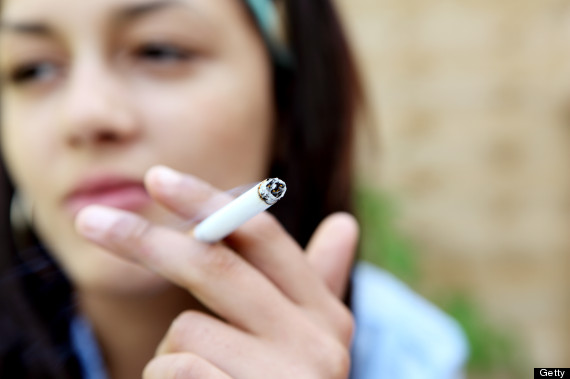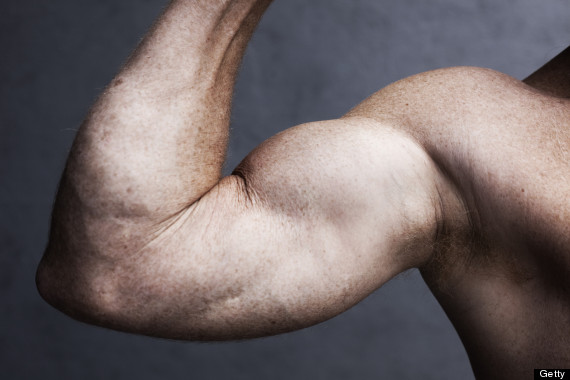Smokers do not like to be asked if they know what their beloved cigarette is doing to their health. Yes, they know. They've taken health class too.
But if you love someone who's hooked on cigarettes, chances are you still try to lobby for a quit date -- not just for your loved one's own health, but for the health of everyone around you as well. If the threat of lung disease, cardiovascular disease, emphysema, leukemia, or ovarian/esophageal/pancreatic/kidney/colon/oral cancer isn't enough to scare off the smoker in your life, maybe one of these lesser-known facts will do the trick.
If you smoke...
Your future kids will smoke too.
It's no surprise that children of smokers are more likely to smoke, but get this: Even if you quit smoking before they're born, your kids might pick up the habit. A recent study published in Pediatrics found that the children of both current and former smokers smoked at a rate of 23 to 29 percent, compared to just eight percent of children of non-smokers.
Even those who dabbled in a high school nicotine habit had children who were at least 3.2 times more likely to smoke than those whose parents never picked up cigarettes. Researchers aren't sure why kids of teen smokers mimic their parents, but at least some in the field think it could be genetic.
"We don't know exactly what's going on here, but my hypothesis is that there is a genetic predisposition toward smoking, whether it is a genetic predisposition toward risk taking behavior, genetic disposition toward experimentation of substances, or even a genetic disposition toward nicotine addiction itself," family medicine expert John Spangler, M.D., told MedPage Today.
You're consuming more nicotine than you think.
It can feel like we're in the age of tobacco regulation, but an investigation by researchers at the Harvard School of Public Health found that nicotine levels in cigarettes went up 11 percent between 1997 and 2005. So even if you've cut back to a weekend-only habit or fewer cigs a day, you're likely maintaining the same level of nicotine, if not ingesting more.
And before you reach for a light pack, keep in mind that smokers tend to pull harder on so-called light cigarettes, making them actually more dangerous. In fact, a U.S. federal judge ruled in 2006 that "light" cigarette smokers could pursue a class action fraud suit because the marketing suggested that these cigarettes were less harmful. According to an article about the case in British Medical Journal, the opposite is true:
Researchers found that people draw harder and deeper on light cigarettes, filling their lungs with more toxic material than they would get from regular cigarettes, said Stanton Glanz, a cardiologist at the medical school of the University of California in San Francisco.
You're contributing to poor global health.
The U.S. has strict guidelines in place about advertising cigarettes to children and teenagers, regulating levels of toxic compounds and providing public education about the ill effects of smoking. That's not true in many other countries -- and tobacco companies use that to their advantage. Global sales have increased so much that U.S. cigarette manufacturers now make more money abroad than they do in the states, reports The Telegraph.
And the World Health Organization reports that almost 80 percent of the world's one billion smokers live in poor and developing countries, which are less likely to regulate cigarette sales and promotion. Want to learn more? Consider the above video -- a 2011 documentary from Current TV's Vanguard series about smoking in Indonesia.
You're losing out on more than $350,000 in savings.
Let's say your cigarettes cost you $8 a pack. According to the American Cancer Society's calculator, that adds up to $2,922 per year. If you began investing that in a retirement account at age 30, you'd contribute an additional $358,602 to your portfolio by age 65, according to a calculation from CNN Money.
It is literally making you weaker.
The effect cigarettes have on your cardiovascular system reduces blood circulation to your organs, your heart and throughout your body, affecting your ability to work out to your potential. But did you know that smoking can actually weaken your muscle response as well?
"Smoking places carbon monoxide in your system, which prevents your muscles from getting as much oxygen to use for energy," Scott Swartzwelder, Ph.D., a clinical professor of medical psychology at Duke University told Men's Health. "The less oxygen your muscles have to draw from, the less efficient they are at contracting, which can limit their capacity for work."
You're contributing to criminal networks -- you know, the ones that also traffic in guns, drugs and people.
Anywhere from 12 to 33 percent of cigarettes sold globally are on the black market, according to the World Health Organization -- and that means the money you paid for your discount smokes could be going into the pocket of organized crime, corrupt government officials and even terrorist organizations.
"The illicit trafficking of tobacco is a multibillion-dollar business, fueling organized crime and corruption, robbing governments of needed tax money, and spurring addiction to a deadly product," wrote Marina Walker Guevara as part of a years-long investigative report produced by The International Consortium of Investigative Journalists. "Organized crime syndicates and terrorist groups such as the Taliban rely on cigarette smuggling to help finance their activities."
You'll catch whatever's going around.
No, that sniffle isn't in your imagination. Cigarette smoking cripples your body's natural defense mechanisms. According to a report from the Surgeon General:
Chemicals in tobacco smoke cause inflammation and cell damage, and can weaken the immune system. The body makes white blood cells to respond to injuries, infections, and cancers. White blood cell counts stay high while smoking continues, meaning the body is constantly fighting against the damage caused by smoking which can lead to disease in almost any part of the body.
What's more, smoking disrupts the respiratory tract's natural defense system, which is why smokers are more likely to suffer from simple bacterial infections like Staphylococcus aureus and Haemophilus influenzae.
You might as well go through airport security 3,600 times.
Worried about that backscatter x-ray machine at the airport? Consider this: Smoking a pack of cigarettes per day for a year contributes about 0.36 millisieverts of radiation dose to your body, compared to the backscatter's .0001, reported Scientific American. Instead of smoking a pack a day, you could get 72 dental x-rays or fly 106 hours.
According to safety experts, we should avoid getting more than one millisievert of radiation above the naturally occurring 3.1 millisieverts that we all receive from sources like soil, rocks and sun. If .36 of your millisievert is taken up by smoking, you aren't leaving much room for necessary expenditures like a mammogram (.4 millisieverts).
You're leaving behind an indelible stain of sickness.
Ever heard of thirdhand smoke? Unlike secondhand smoke, which is the contact non-smokers have with actual smoke in their presence, thirdhand smoke describes the toxicants that are left behind on surfaces long after a smoker has left the area.
"Thirdhand smoke residue builds up on surfaces over time and resists normal cleaning. Thirdhand smoke can't be eliminated by airing out rooms, opening windows, using fans or air conditioners, or confining smoking to only certain areas of a home," Lowell Dale, M.D., an internist at the Mayo Clinic, explains.
And emerging research suggests that it causes DNA damage beyond what researchers previously thought. "Tobacco-specific nitrosamines, some of the chemical compounds in thirdhand smoke, are among the most potent carcinogens there are," wrote researcher Lara Gundel, a scientist at the Lawrence Berkeley National laboratory at the time of her lab study on thirdhand smoke. "They stay on surfaces, and when those surfaces are clothing or carpets, the danger to children is especially serious."
Still not convinced? Here are some health benefits of quitting:
